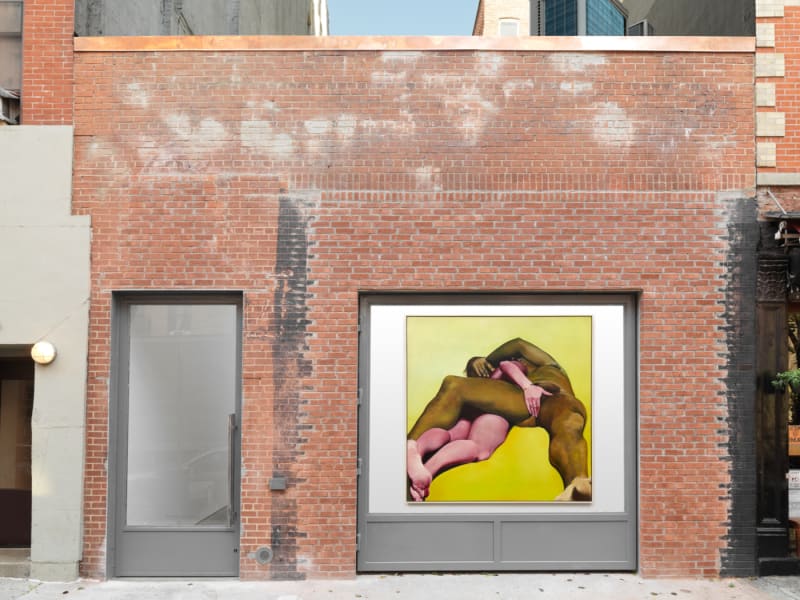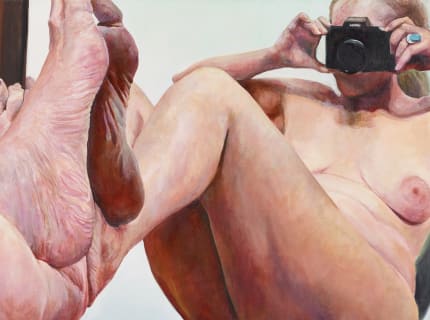Joan Semmel included in the group exhibition Painting in New York: 1971–83 at Karma, New York.
Karma's press release follows:
Karma is pleased to present Painting in New York: 1971–83. This exhibition brings together the work of thirty painters of diverse practice and backgrounds, all of whom were active in New York City in the 1970s and whose lives and works were impacted by the upheavals that radiated from feminism’s second wave. The show will be held at 172 and 188 East 2nd Street, New York and will run from September 21st to November 5th, 2022.
In the early 1970s, a new kind of painting was emerging: elements of sculpture and textile were being synthesized into the medium, which was itself being rethought by new art historical methodologies. At a time of debate around the relevance of painting as a medium, women were reinvigorating the practice. These artistic developments coincided with a shifting political landscape. In what became known as second-wave feminism, women globally revolted against their marginalized status in society. The personal was political and myriad formations—from feminist publications to militant acitivsm and small meetings for women to share experiences and strategize, dubbed “consciousness-raising groups”—sprung forth. Many women were moved by this collective outrage and the belief that a better world was theirs for the making.
In New York City, the art scene reflected these dynamics and developments. Artist collectives, galleries, criticism, and exhibitions proliferated: Women Artists in Revolution, “Where We At” Black Women Artists, Inc., the Heresies Collective, the Ad Hoc Committee of Women Artists, A.I.R. Gallery, Women Choose Women, and so on. Activists and demonstrators protested the Whitney Museum for its exclusion of art by women and the MoMA over the disparity of women represented in their permanent collection. Impassioned and bold art was being made across a compelling range of styles. Artists were dismantling the boundaries placed upon traditions of image making, from classical portraiture to Abstract Expressionism. The grid, a formal mode of organizing visual information, was being theorized, fixated upon, and torn apart.
Painting in New York: 1971-83 is a portrait of painting during a time of political and aesthetic revolt, curated from the perspective of Ivy Shapiro, who was raised in the tangle of feminism and art making in New York City. The paintings mounted in this exhibit do not form a complete retrospective but are instead gathered in the hope that they will catalyze further inquiry into the works of the artists who made them—whose dreams, commitments, and legacies matter now more than ever.
The show brings together works by Emma Amos, Ida Applebroog, Jennifer Bartlett, Betty Blayton, Vivian Browne, Cynthia Carlson, Martha Diamond, Louise Fishman, Suzan Frecon, Nancy Graves, Cynthia Hawkins, Mary Heilmann, Virginia Jaramillo, Jane Kaplowitz, Harriet Korman, Lois Lane, Helen Marden, Dindga McCannon, Ree Morton, Elizabeth Murray, Ellen Phelan, Howardena Pindell, Sylvia Plimack Mangold, Faith Ringgold, Dorothea Rockburne, Susan Rothenberg, Joan Semmel, Jenny Snider, Joan Snyder and Pat Steir.
Painting in New York: 1971-83 will be accompanied by a forthcoming catalog, featuring essays by Hilton Als, Elizabeth Hess, Lucy Lippard, and Ivy Shapiro, and biographical texts by Ellen Feiss, Lauren O’Neill-Butler, and Clémence White.

